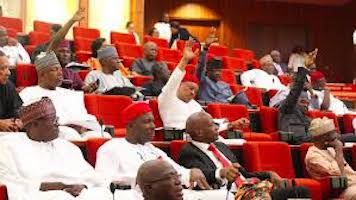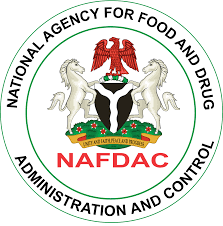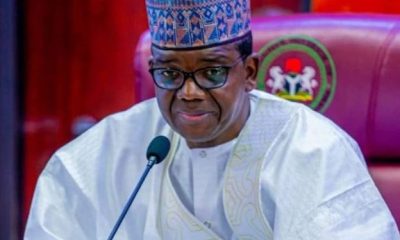Environment
Senate Makes Progress Towards Stopping Payment of Annual Rents in FCT

A bill seeking to make the annual payment of rent illegal in the Federal Capital Territory has scaled second reading in the Senate.
Tagged: “A Bill for the Regulation of Advanced Rent on Residential Apartments, Office Space” was sponsored by Senator Smart Adeyemi (Kogi West).
The lawmaker, in his lead debate on the general principles, said the bill seeks to regulate the mode of payment of rent on residential apartments, office space, rooms and accommodation in the FCT.
According to him, the move by the Senate to regulate the payment of rents in the FCT stemmed from the obligation of its constitutional responsibilities, aimed at impacting the lives of residents.
“If passed, this Bill will improve the well-being and standard of living of residents and minimize corruption and immorality emanating from the oppressive tenancy system in the Federal Capital Territory.
“This Bill will make life less stressful and less painful for majority of the down-trodden and low income earners in the Federal Territory”, Adeyemi said.
He explained further that due to global economic recession, life has become very challenging and almost unbearable for the low income earners despite the huge palliative measures by the Federal Government through the N-POWER traders money.
He noted that in the FCT, Landlords demand between one to three years advanced rent, a situation which he pointed, “automatically adds a huge burden on the masses, subsequently giving rise to desperation and corruption.”
He lamented that the “tenancy system has continuously impoverished Nigerians who are salaried employees that can only pay rent after having received their first remuneration.”
“This tenancy system is unafrican, unislamic and indeed unbiblical”, the lawmaker added.
Adeyemi expressed concern that many residents of the FCT are finding it difficult to cope with huge rent payment, adding that, “many houses built within the city center for such purposes are empty.”
He said that yearly tenancy has continued to breed corruption, moral decadence and huge inequality as low income earners who cannot afford to continually pay their rent.
According to him, some tenants now engage in corrupt practices, immorality, and even criminal acts to meet the pressing need of shelter.
He underscored the need for Legislation aimed towards justice, fairness, equity and improved standard of living.
He noted that in the FCT, a single one room apartment ranges from one million (N1,000,000) Naira to two million (N2,000,000) Naira within the city.
According to the lawmaker, in the satellite towns such as Kubwa, Nyanya, Kuje, Lugbe, rents are still not affordable for the common man as it ranges from Three hundred and fifty thousand naira (N350,000.00) to Five Hundred thousand naira (N500,000.00).
He stated that the bill, therefore, seeks to reduce advance payment for new tenants to three months and, thereafter, proceed with the monthly payment scheme.
“It also seeks to protect low income earners from any form of oppression by homeowners.
“The bill also seeks to provide a window for legal action for any form of oppression.
“Importantly, it will also serve as a safety net for Landlords against erring tenants”, he added.
Contributing to the debate, Senator Aliyu Sabi Abdullahi, while supporting the bill, described the piece of legislation as “people-centered.”
He said, “The truth is out there, many residents in the FCT are groaning under this very difficult system where people are expected to pay house rent in advance.
“With the policy where government has withdrawn participation in providing official quarters with demonetization, we are all aware, young Nigerians who are gaining employment within the precinct of the FCT for example, majority of them are actually in the outskirts.
“This is because it is extremely difficult for most of these young Nigerians to get the quantum of money that represent two years rent.
“If there is a good system as this, where on a monthly basis as the man receives his salary, he is making payment for what he has consumed, I think it will be a very good and welfare oriented system, one that is friendly to those that do not have.”
The Deputy Senate President, Ovie Omo-Agege, who presided over plenary, described the bill as “popular” owing to the number of Nigerians who have showed interest in it.
However, Senator Chimaroke Nnamani (Enugu East), a People’s Democratic Party (PDP) Senator and the only lawmaker in the chamber who spoke against the bill, argued the issue of rent payment should be driven by market forces.
“The issue of rental payment, either in advance or installments is purely economical and should be driven by market forces.
“Such market forces as availability of land, cost of building materials and income.
“If government wants to ameliorate the sufferings of the masses, government can go into housing schemes, mortgage schemes, housing credit facilities, not control the business of private individuals in an emerging African democracy.
“I, therefore, oppose, and oppose vigorously this bill”, he said.
Senators, however, voted overwhelmingly in support of the bill when the Deputy Senate President put the question for it to be read a second time.
The bill was subsequently referred by Omo-Agege to the Committee on Housing and Urban Development for further inputs. The Committee was given four weeks to report back to the Senate in plenary.
Environment
Prolonged Public Holidays Come with Negative Economic Effects on Citizens – Anambra Residents

Anambra residents have slammed the additional day approved by the Federal Government for the Muslim faithful to celebrate the 2024 Eid-Ei-Fitr, saying this will have negative effects on the economy.
The Federal government had early declared April 9 and 10 as Muslim-Ummah for the successful completion of a month’s spiritual rejuvenation.
Reports says that residents of Anambra capital city believe that the additional day which they did not plan for will result in economic hardship to the citizenry.
Most respondents believe that people had planned to resume their economic activities instead of wasting their time staying at home doing nothing..
Former Chairman, Awka Chamber of Commerce, Chief Felly Akosa, described the additional day to the two days approved earlier as “unfair to the economy of the country as people were unprepared for the additional day.
Akosa said that although it is right for the Muslim faithful to celebrate their holiday after a month-long fasting, the process needs to be carefully planned for in place of the additional rest day which could inhibit business activities.
Chief Damian Okeke-Ogene, National Vice President of Igbo Apex Social Cultural body, Ohanaeze Ndigbo, said the policy would cause huge economic waste as businesses are put on hold,
He advised that, in future, a proper and well planned programme needs to be in place before declaring a public holiday for any celebration that will be national.
“Our economy and other sectors are not very healthy,” and it would, therefore be appropriate to plan well to avoid declarations that will hamper the citizens’ welfare.
Mazi Christian Beluchukwu, a business man in Awka, described the extension of the Eid-El-Fitr public holiday to Thursday, April 11, as an added hardship for the citizenry.
Beluchukwu said that any public holiday for three days, April 9 to 11, to celebrate any feast in the country is an economic loss to the nation.
He said that it was best to stick to the two-day national public holidays as this gives room for the people to plan their activities very well.
He stated that his wife went to a public hospital on Tuesday and was unattended to because there was no doctor on seat to provide medical attention.
“She resorted to visiting a private hospital which cost extra money which the public hospital is expected to handle at a reasonable cost. (NAN)
Environment
World Bank Fund: Corporation Rehabilitates Treatment Plant, Reticulation in Jos South

The Jos Water Services Corporation (JWSC) has said that the World Bank fund received would be used to boost water supply to Bukuru and environs in Jos South Local Government Area.
Mr Apollos Samchi, the Managing Director of the corporation, said that N1.7 billion would be expended on the rehabilitation of water treatment plant, over head steel tank and laying of pipes to homes of consumers.
Samchi, who disclosed this on Friday in Jos, during a two-day capacity building workshop, said that the projects were expected to be completed in four months.
Reports says that the workshop organised for contractors has at its theme: “Implementation of Environmental and Social Management Plans for Projects in Jos South.
The MD said that the projects would ensure steady provision of potable water to residents in Gyel and Kurgiya in Jos South Local Government Area.
He said the treatment plant when rehabilitated would pump out 5,000 cubic litres of water daily.
The MD further stated that the reticulation exercise would cover residents who weren’t initially connected to public water supply in the area.
Samchi said that the essence of the workshop was to ensure that the contractors were trained to develop adequate measures and controls to minimise and mitigate potential environmental and social risks that could adversely affect the project implementation.
He called on all the contractors handling the projects to ensure that they adhered to the environmental and safety standards and deliver within the specified timeframe.
In his remarks, Mr Jonathan Malann, the Plateau Project Coordinator, Sustainable Urban, Rural Water Supply, Sanitation and Hygiene programme (SURWASH), also advised contractors to adhere to the environmental and safety standards as provided by the World Bank.
The Federal Government had received $700m financing from the World Bank to ensure that all its people have access to sustainable and safely managed WASH services.
The seven participating states are Plateau, Delta, Ekiti, Gombe, Imo, Katsina, and Kaduna.(NAN)
Environment
Erosion Control Project: Gombe SEC Approves N389m Compensation for Residents

The Gombe State Executive Council (SEC) has approved payment of N389 million as compensation for residents that would be affected by the gully erosion control project at Federal College of Education (FCE) Technical and its surrounding communities.
The Commissioner for Finance, Gombe State, Malam Mohammed Magaji, stated this at the end of the SEC meeting on Friday in Gombe.
Magaji said the payment, which would commence immediately, would be for individuals and organisations along the gully erosion site.
He said almost 1000 persons were expected to benefit from the gesture.
According to him, the compensation is part of the requirements of the World Bank, which specifies that such payments be made to property owners.
Magaji said the payment would also be made to ensure seamless resettlement of affected persons.
“The beneficiaries are in hundreds, almost a 1,000 people; there is compensation for houses, and also for business premises.
“There is also stipends for the elderly living around that area so that they are able to have good livelihood,” he said.
The commissioner for Education, Hajiya Aishatu Maigari, also said the SEC approved upgrade of the five mega senior secondary schools in the state to sustain improvement in the education sector.
Maigari said the upgrade would be carried out based on the needs of each of the schools.
She stated that infrastructure in some of the schools were already being upgraded to global standards.
“We have seen construction of toilets, installation of solar-powered light, construction of roads, school clinics, boreholes and many more,” she said.
The News Agency of Nigeria (NAN) reports that the state government had on Nov. 23 signed a N12 billion contract with Triacta Nigeria Ltd. for a 21-kilometre gully erosion control work in six communities within Gombe metropolis.
The project is under ACRESAL project, a World Bank-assisted project to address the challenges of land degradation and climate change in northern Nigeria. (NAN)

























